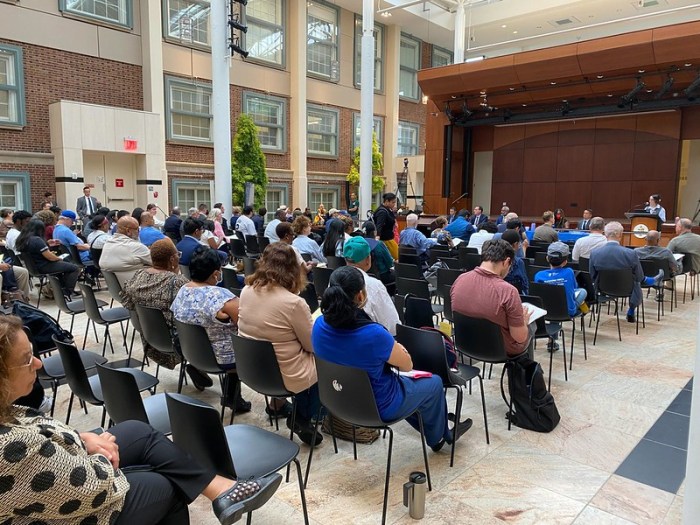But Lawmakers Confident Funds Will Be Restored
The executive city budget proposal for 2014, released by Mayor Michael Bloomberg on May 2, makes cuts to child care services seen in the past, but, as in past budget processes, the services probably won’t be hit as hard as the mayor is proposing, officials said.
City Council Member Karen Koslowitz told the Times Newsweekly that residents can expect a budget process similar to that of previous years-the mayor makes deep cuts to fire service, child care and cultural institutions, and the council restores funding through its discretionary budget.
“Of course, we’ll restore it,” Koslowitz said, refering to funding for high-profile services the mayor has cut in some form each year since the mid-2000s.
It remains to be seen exactly how much money the council will restore, she said.
With no action, cuts to early child care could affect up to 47,000 kids, according to a study from the Campaign for Children, a coalition of child care and after-school advocacy and provider organizations.
According to a 2012 U.S. Census estimate, Queens is home to 2.8 million people, and about six percent- or roughly 134,000-are under the age of five.
The proposed budget cuts funds for 3,472 child care center seats citywide, according to the report. Queens will lose 947 seats across 18 child care sites.
The borough would see the deepest cut in “family child care” (a type of in-home child care) in the city with the elimination of 358 slots- 35 percent of the total slots cut citywide.
Additionally, the proposed budget nixes one-fifth of Out-of- School Time (OST) programs in the borough and cuts funding to onethird of Queens’ remaining OST programs, the report shows. According to the Campaign for Children, 46 of Queens’ OST sites will not be funded and there will be a 21-percent across-the-board cut to 63 locations.
The OST program is a mayoral initiative aimed at providing free academic, recreational and cultural activities grades K-12 after school, during holidays and in the summer, according to the New York Department of Youth and Community Development.
In addition, the mayor’s FY 2014 proposal does not restore $12.1 million for 4,400 school age vouchers, $1 million for technical assistance to child care providers, or $100,000 for child care worker job training and placement, according to the Campaign for Children.
In the 2013 budget, the City Council restored nearly $120 million for child care and after-school programs cut by the mayor, it has been reported.
The cuts to child care and afterschool programs disproportionately affect Queens residents.
The potential 947 lost child care seats represent 27 percent of the seats cut citywide. Thirty-five percent of family child care seats lost are in Queens County. The borough lost relatively few OST sites, but is home to the largest number of sites affected by the 21 percent acrossthe board cut for other OST sites.
Koslowitz told this paper that the disproportionate service cuts in Queens are part of an institutional problem that’s getting better, slowly.
“The Queens delegation-we’re fighting to equalize how services get cut,” she said.
Several other elected officials have come forward to criticize the proposed budget.
“Once again the New York City Council has been posed with the task of fighting to restore funding to the institutions and organizations that our City residents love dearly, Council Member Jimmy Van Bramer stated in a press release, May 3. “From the youngest of children, to the most senior among us, and everyone in between, New York City’s residents deserve a better budget-a budget which grants them all the educational services as well as social and cultural programming that has made New York City the information and cultural capital of the world.”
City Council Speaker and mayoral candidate Christine Quinn and Finance Chair Domenic Recchia, Jr. issued a joint statement, May 2, calling the cuts troubling and saying they would do “irreparable harm to our city’s middle class families.”
In spite of cuts to child care and after-school programs, the city’s education budget has increased.
The city will spend more than $13 billion in FY 2014-the most it will spend on any city agency that year, according to a report issued by Bloomberg, May 2.
The report notes the restoration of $250 million in State education aid that was lost in 2013 after teachers’ unions and the city failed to come to a compromise over teacher evaluations.
The administration’s annual increase in city-funded education expenses comes as the share of State-funded education expenses has declined: The city is now spending $4.7 billion more than the state on education, shouldering 61 percent of non-federally funded education costs, while the state funds 39 percent, according to the Mayor’s report. In FY 2002, the state and the city evenly shared the costs, it said.
The City Council’s budget hearing and negotiation process officially begins today, Thursday, May 9.
The fiscal year runs from July 1 to June 30 of the following year.
































